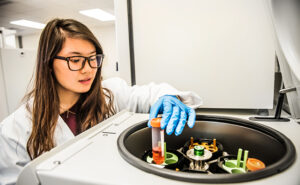 Integrate knowledge of the life sciences with the principles of engineering to understand how biological systems work so you can design and develop technologies, materials and devices that will have a positive impact on human health and well-being.
Integrate knowledge of the life sciences with the principles of engineering to understand how biological systems work so you can design and develop technologies, materials and devices that will have a positive impact on human health and well-being.
What you’ll study
- Molecular Biology and Biochemistry
- Engineering Physiology
- Biomaterials
- Biomechanics
- Biomedical Device Design
- Tissue Engineering
Careers
- Biomedical engineer
- Product development engineer
- Field service engineer
- Quality control engineer
- Technical sales specialist
- Process design engineer
- Process safety engineer
Biological Engineers use engineering methods and the principles of biology to solve some of the greatest challenges facing society today. Graduates are positioned to work in a variety of industries – such as medical devices, diagnostics, genetics, healthcare industry support, pharmaceutical manufacture, drug discovery, environmental remediation, or agricultural advancement – as well as in nonprofit and academic research. A broad area of study, bioengineering can include elements of electrical and mechanical engineering, computer science, chemistry and biology.
Details about the specific degree and college requirements for the BS – Biochemical Engineering degree are found in the UGA Bulletin.
Program mission
The University of Georgia Biological Engineering undergraduate program provides engineering education in a liberal arts background producing graduates with the ability to integrate knowledge from several disciplines including skills to analyze and design relevant systems for solving problems. The graduates of this program have a deep background in engineering, mathematical and biological sciences, and the ability to design systems that integrate the biology with technology.
Program educational objectives
The following Program Educational Objectives relate to the knowledge, skills, and behaviors that UGA College of Engineering alumni with degrees in biological engineering should demonstrate as they move through their careers as engineers and as contributing members of society:
- Sought, learned, and applied new knowledge to solving complex problems and pursuing life-long learning.
- Synthesized knowledge across disciplines in order to understand the societal impacts of decisions and contribute effectively to teams.
- Applied scientific and engineering methods to evaluate existing practices and solve biological engineering problems.


